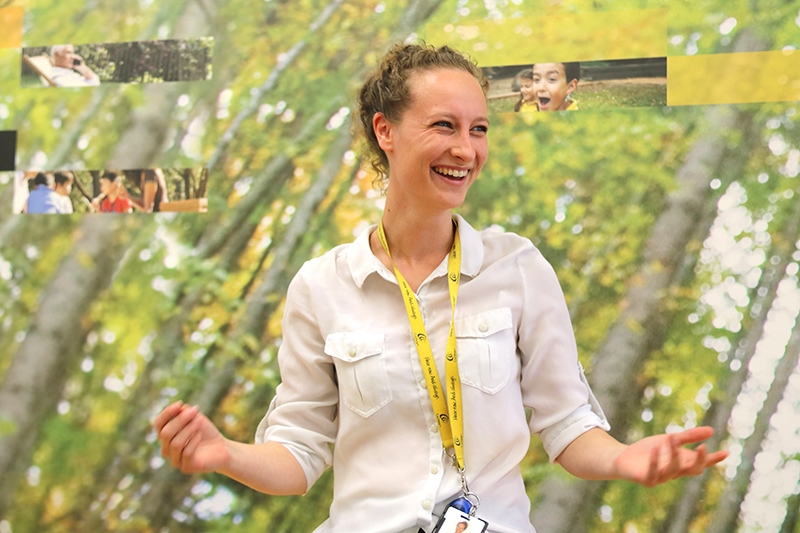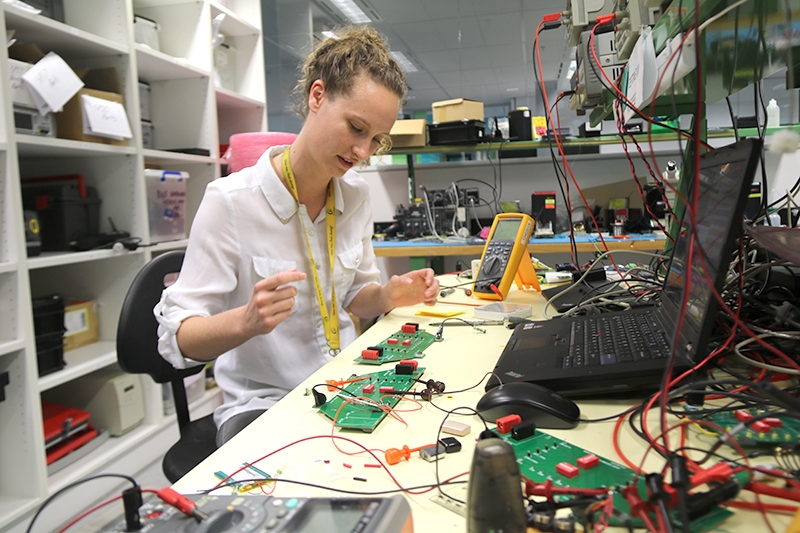LGBTQ+ at Cochlear

What's your job about?
At Cochlear, we design and manufacture cochlear implants to restore hearing for severe or profound hearing loss. Cochlear implants bypass normal hearing processes and instead directly stimulate the cochlea. As a systems engineer, I integrate electrical circuits, mechanical components and sound processing firmware, helping to improve future designs. I particularly focus on the interface between internal and external devices. For example, the external sound processor sends power and data to the implant through the skin via an oscillating magnetic field. This is sort of like wireless charging! Cochlear implants are designed to last a lifetime, not easy from an engineering perspective. However, the externals are often improved, allowing upgrades as they are launched. This means that a lot goes into every product to ensure we can still deliver hearing solutions to implantees from 10, 20 or even 40 years ago! It is a challenging role, to say the least. My day to day tasks varies depending on the stage of the project. On an average day, you can find me running cross-functional team meetings, preparing information to present to stakeholders, documenting product architecture or running tests in the lab. My work has even taken me to places like Japan and Belgium!
What's your background?
I grew up in Melbourne and had always been good at maths and science but didn’t even consider engineering until I left school. I guess I just didn’t really have enough role models. Once I started my biomedical science degree at Monash, I soon learnt about possible careers in engineering. I wanted to help people and was drawn to the field of medical science. So I decided to change to a double degree in electrical engineering. Many people questioned the choice but as soon as I mentioned Cochlear it made perfect sense. For me, it was a dream company to work for, bringing my study areas together to help people. I had some incredible opportunities during Uni to study abroad in Malaysia and Denmark, as well as work at med-tech companies. But during all of this, I was struggling with my sexuality and finding it hard to relate to people around me. My coming out as a lesbian was very gradual and painful. It took a long time to start telling people. I feared what people would think or of disappointing them, especially my family. It was once I had a girlfriend that I really knew I couldn’t hide it anymore. I started to tell more friends until I eventually lost track of who knew. I have been very lucky to have received mostly positive or neutral responses. It was a bit more awkward with my family. My parents actually asked me as a joke about it one day and to their astonishment, I said yes. When I moved to Sydney I decided it was time to re-invent myself. Since then, I have made a conscious effort not to hide it, if the topic ever comes up. It’s a very liberating feeling. In hindsight, I’ve realised people don’t care as much as I thought!
How did you come out of your workplace? What lead you to come out at that time?
My coming out process at work was also gradual, but much less scary. I knew that I definitely wanted to be out at work but I took my time testing the waters with the graduates and other young engineers first. Once that went well, I felt a lot more comfortable telling others as opportunities arose. Obviously, I didn’t prance around the office proclaiming my sexuality, but I also didn’t hide it.

Have your colleagues done anything to make you feel comfortable?
My work colleagues have been amazing. I really don’t feel like I am treated any differently, which is how it should be. The best that anyone can do to make you feel comfortable is to show genuine support and interest in you just like you would with anyone else. This year at ‘Wear It Purple’ day so many of my work colleagues came along to show their support. I was truly touched. Most managers I have had so far have been openly LGBTQI supportive.
Does your employer offer any specific support for LGBTQIA employees?
Cochlear doesn’t currently offer any specific LGBTQIA support, however, we are starting down that journey as an organisation. Cochlear is still a relatively small business (only 3500 employees globally), so the core building blocks of any large business such as corporate responsibility are still in their infancy. Cochlear has only recently released our new diversity strategy, which includes LGBTQIA diversity. This year, we celebrated Wear It Purple day. I was personally involved in trying to get it off the ground and I’m excited at the thought of more opportunities like this in the future. Cochlear has one of the biggest corporate City2Surf teams every year. My dream would be for Cochlear to have the biggest Mardi Gras sponsorship and involvement too!
Has being a member of the LGBTQIA community given you any advantages or disadvantages at work?
So far it hasn’t afforded me any unique advantages, but this is balanced by not having any disadvantages. From the time I was hired until now, I haven’t sensed any historical bias or discrimination. The life sciences industry is typically more conservative, thus not typically thought of as at the leading edge of support for the community. I am hopeful in the future with Cochlear’s new diversity strategy, there will be some clearer advantages.
3 pieces of advice for yourself when you were a student...
- Get out of that closet already! You’ll feel more comfortable and happy being yourself than hiding it. Being happy gives you more energy to achieve things.
- Find your best way of learning. I know that I learn best by doing, so my advice to myself is to get as hands-on as possible. Your path may be different!
- Don’t get overwhelmed by seeing the entire mountain of work to achieve. Break it down into small goals and steps to achieve those goals. I am very goal-oriented so this also helps to motivate me. This applies to work, sport, music or anything else in life.